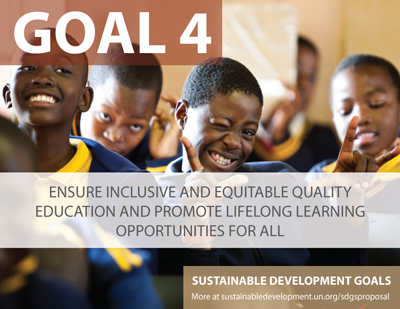|
| Workshop Partners |
|
Working Group discussing Goal 4.3 “By 2030, ensure equal access for all women and men to affordable and quality technical, vocational and tertiary education, including university”
Background :
The Sustainable Development Goal 4 is focused on ensuring inclusive and equitable quality education and promoting lifelong learning opportunities for all. More specifically the goal 4.3 aims to “by 2030, ensure equal access for all women and men to affordable and quality technical, vocational and tertiary education, including university’. Goal 4.4 aims to “by 2030, substantially increase the number of youth and adults who have relevant skills, including technical and vocational skills, for employment, decent jobs and entrepreneurship”. It is important here to discuss the relevance of education, pedagogy and curriculum in the context of sustainability. The Tertiary and Higher Education institutions have to play the critical role of reinventing, innovating and developing content, teaching and research into making education relevant to achieving sustainability goals. Education is not limited to Goal 4 but its relevance to achieving SDGs in the broadest sense needs to be the way Higher and Tertiary Education addresses itself to achieving SDGs.
Global networks and partnerships play an important part in providing the impetus and bringing together institutions working in the area of Higher Education. Some of these such as the Higher Education Sustainability Initiative (HESI), created as a partnership of UN entities (UNESCO, UN-DESA, UNEP, Global Compact, and UNU) in the run-up to the United Nations Conference on Sustainable Development (Rio+20) are aimed at galavanizing commitments from higher education institutions to teach and encourage research on sustainable development, greening campuses and support local sustainability efforts. (1)
 The Regional Centre of Expertise (RCE) also plays a central role in the transfer of global technologies, knowledge, and experiences at the local level through their programmes and activities and majorly coordinated from universities. Higher education is thus involved in enhancing collaborative partnerships for sustainable development and is taking a lead role in research and development as well.
The Regional Centre of Expertise (RCE) also plays a central role in the transfer of global technologies, knowledge, and experiences at the local level through their programmes and activities and majorly coordinated from universities. Higher education is thus involved in enhancing collaborative partnerships for sustainable development and is taking a lead role in research and development as well.
Another very important initiative, the Global Universities Partnership on Environment and Sustainability (GUPES), a flagship programme of UNEP’s Environmental Education and Training Unit (EETU), aims to promote the integration of environment and sustainability concerns into teaching, research, community engagement, the management of universities including greening of university infrastructure/facilities/operations, as well as to enhance student engagement and participation in sustainability activities both within and beyond universities.
Technical Vocational Education and Training (TVET) focused on provision of relevant skills to youth for work, is designed to be inclusive and support lifelong learning. It has the scope for supporting transition of economies and societies to become low-carbon and sustainable. The tertiary education institutions and institutions engaged in TVET can together create an enabling atmosphere for societies to transform themselves into sustainable societies.
Aim of the workshop:
The workshop aimed at building on the experience of the tertiary and higher education institutions and the TVET institutions in developing pedagogy, curriculum and research for sustainability, to discuss the way forward for achieving SDGs, and identify areas for collaboration and further research in the way these institutions can promote sustainable development. It identified competencies required for achieving these education goals.
Objectives:
a. To share and learn from examples of good practices of Higher education institutions which have innovated in terms of pedagogy, methodology, curriculum for integrating sustainability concerns
b. To discuss the role of knowledge creation by Higher education institutions in achieving SDGs
c. To discuss the role of HE and TVET in fulfilling the demand for quality skilled human resource
d. To discuss strategies to strengthen the institutions to be able to fulfil the need for such quality skilled human resource.
e. To discuss the roles and the way networks and partnerships such as the HESI, GUPES, RCE, TVET and other local and regional networks can collaborate to support achieving SDGs
Outcome:
a. Recommendations to the governments for strengthening HE institutions and vocational education institutions within their countries.
b. Identifying of examples that can be scaled up within and across countries
c. Collaboration and partnerships to support sustainability teaching and learning
CEE Focal point: Madhavi Joshi, Ketki Gadre, Vatsalya Shukla
[email protected], [email protected], [email protected]
Workshop Sessions
Date & Time |
Session Details |
|
11 January 2016 |
||
14:30 - 15:00 Hrs. (0.5 Hrs.)
Session I |
Inauguration of Goal 4.1, 4.2 and 4.3 |
|
Session II |
Whole Institution Approach |
|
12 January 2016 |
||
Session III |
Pedagogy and curriculum in higher education |
|
Session IV |
Approaches to Measure Learning (Common Session 4.1 and 4.3) |
|
13 January 2016 |
||
Session V |
Sharing and Learning networks and platforms |
|
Session VI |
Recommendations and the way forward |
|
Total 9 Hours over 3 days





